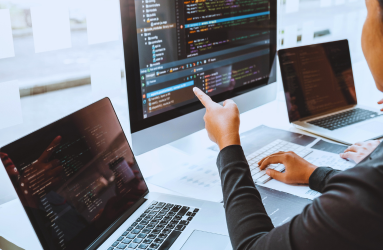IP Trends 2021: How Intellectual Property is Evolving Around Us

Table of Contents
Overview: IP Trends 2021
The beginning of 2021 is, undoubtedly, an unusual period. We are still in the midst of an outbreak, and several nations are still in a state of emergency. The worldwide introduction of vaccines is on the horizon, and the global economy is still strong amid uncertain trade headwinds. Keeping up with a rapidly evolving intellectual property enforcement and brand protection environment in 2021 will need extra focus and, in many cases, activity restructuring.
Trial dates had been pushed back, filing deadlines had been pushed back, and everything was in flux as other states and countries enacted their own legislation. The shifting legal environment, particularly in the intellectual property sector, is expected to continue in 2021, as a greater range of changes emerges as a result of the rapid increase of digital technology.
And if there was one certainty, it was that the epidemic has not put a halt to worldwide intellectual property activity. We needed a path forward. This required us to come up with new concepts and the latest technological trends.
In this article, we will cover predictions regarding major IP trends in 2021, ranging from the COVID-19 epidemic driving up expenditures in digital technologies such as live-streaming platforms, to rising businesses' attention on copyright issues as brands take to the digital world as they heavily rely on this medium to market their businesses and to the growing use of AI.
Not all inventors must be present at the workplace to perform their responsibilities
The internationally enforced shift in how people work has had an influence on IP Analysts and how they implement brand protection plans:
Organizations are always considering whether innovators need to be in the office to get their tasks done due to globally required work-from-home regulations in efforts to combat COVID-19. And the epidemic demonstrated that not all innovators must be present in the workplace to achieve their jobs. Here are a few intriguing instances:
- Software developers, for example, have long been allowed to work remotely, and their productivity has remained stable, if not increased, under COVID-19.
- When the innovators required a tangible scientific setting, firms went to considerable efforts to ensure that their innovators had access to appropriate personal protective equipment and kept other workers at home so that their innovators could operate securely and on-site.
Brand owners and intellectual property practitioners must be informed of recent advancements and changes that may dominate the remainder of the year.
COVID-related counterfeit goods
Personal Protection Equipment (PPE)
In the year 2020, there were several accounts of counterfeit production and supply of pandemic essentials pertaining to PPE (disinfectants, cleansers, sanitizers, masks, and sanitizers), and this is projected to continue until the end of 2021.
IP advisors and customs regulatory officials across the global economy are actively collaborating with PPE-related brand owners and it is likely to see many of these brand owners integrating in-house IP counsel to further combat and preserve COVID fighting products.
Keeping a steady supply of authentic Covid protection goods on hand is a key global necessity.
Vaccinations vs. Irrelevant Patents
The introduction of vaccines to the majority of the global public introduces a new challenge: How Do We Curb and Mitigate Counterfeit? Immediate action necessitates the coordination of pharmaceutical producers and distribution/supply chain networks - many of which begin in countries like China and India.
While intellectual property compliance is often employed to halt unlawful chemical manufacturing and transportation of pharma-based goods, pertaining patents may no longer be relevant. There is a noticeable unwillingness to pursue intellectual property protection for vaccine formulae, given the short interval of time since its discovery. This results in very low intellectual property enforcement over innovative and effective vaccines, making the industry very susceptible to the emergence of cheaper alternatives.
Counterfeit products related to COVID-combating products might also be extremely hazardous to human recipients, as they could deem as toxic. And in the case they aren’t hazardous, they will probably be ineffectual against the virus and will thus enable the further spread of disease among the masses.
We have yet to hear of any notable incidents using counterfeit vaccinations. However, the entire globe must remain attentive and vigilant.
Employment of Artificial Intelligence in Intellectual Property Searches
Many elements of our life, including our homes and health, are destined to be transformed by artificial intelligence (AI). AI is now extensively utilized in internet research and home gadgets with speech recognition, as it will become much more prevalent in the coming years.
This will have huge ramifications since AI will perform numerous duties that were previously solely performed by humans. AI will eliminate most of the need for human intervention. This will have a significant impact on intellectual property law.
Several IP proprietary institutions are witnessing the increase of AI in supporting Patent and TM searches, and this trend is predicted to continue in 2021:
- The USPTO (the United States Patent and Trademark Office) has begun to use AI to aid with patent classification and searches in order to facilitate examiners with their duties and is drastically improving examiner efficiency in terms of time management and accuracy.
- The EPO (European Patent Office) has also emphasised why and how AI would help with prior art investigations, so it is reasonable to presume that AI will be introduced to expand inventors in the APAC (Asia-Pacific) area with previous art searches and analysis of their innovation.
- As of today, there is now a regulatory structure applicable within the French legislations, to attempt to protect some AI-generated innovations and/or creations. As a result, it is critical for businesses to estimate the worth of their intellectual property assets and to make use of this great way of this initiative. Hopefully, other legislative entities will follow suit.
What’s Next for Artificial Intelligence and Intellectual Property?
In retrospect, we predict that innovators, lawyers, and judicial theorists would have concentrated their efforts on beginning conversations on compelling intellectual property administrations throughout the globe — and the lawmakers who establish the legislation and rules that govern them — to provide the general public a platform to grant inventor status to systems that create innovative, beneficial, and domain-specific breakthroughs.
While the argument may seem to be theoretical, it has real-world implications.
The Move towards fully utilising AI in IP has begun but needs to pick up the pace. So as to keep up with the break-neck speeds at which the world around us is evolving.
Intellectual Property Owners Worrisome of Budget Cuts
Budget cuts are top of the corporate news. Reports confirm Intellectual Property budget cuts across many industries and are not limited to a certain part of the world. The key to future actions is the ability to convince business stakeholders of the value of IP work including IP enforcement of the commercial returns rather than the legal outcomes.
With profits down across many sectors, Intellectual Property holders will need to almost start afresh.
Due to a lack of cash flow, an intriguing strategy we've noticed is how corporations are increasingly compelled to derive economic value from inactive intellectual property assets.
With so many enterprises expected to put their intellectual property assets to work in 2021, legislative and judicial changes throughout the globe will serve to further facilitate IP owners in the protection of their assets.
IP Developments and Counterfeit Enhancements
Following our coverage of combating counterfeit covid-related items, we are encouraged to emphasise how counterfeit and piracy continue to be a serious concern for consumer goods, and current advancements are simply too sluggish for post-covid regulation to maintain pace.
Brand owners are increasingly cracking down on online retailers to handle IP infringement, especially when legitimate things are increasingly being sold on the same sites. Intellectual property lawyers have a responsibility to develop inventive new solutions, given the shifting enforcement landscape.
Many brand owners will need to generate different performance metrics for the future and the beginning of 2021 is a great moment for such an evaluation.
Intellectual Property Trends Within the Digital Spectrum
Brands Are No Longer Turning a Blind Eye
During the first half of 2021, brand enforcement tactics will become more prevalent, and brand owners will understand that the abuse of their trade names and product names on services is a costly endeavor to businesses.
Online IP commerce enforcement is becoming brand owners' top concern. However, they cannot overlook the fact that fraudulent items are still manufactured and distributed; brand owners are determining how to allocate resources in order to eliminate obvious digital services and attack the underground manufacturing industry behind this.
Spotlight On Worldwide Customs
Many nations' customs departments have failed to establish anti-counterfeiting operations, despite the fact that import and export are the primary sources of supply.
Pressure on states that mass manufacture fake goods, to terminate their massive illegal counterfeit export trade will persist, and e-commerce networks will also be urged to deploy technological and other monitoring solutions to alleviate the pressure on removal procedures.
Content Piracy is No Longer Offline
Anti-piracy is no longer an offline concern but has become predominantly digital. This provides a fresh urgency for tech-based inventors to come up with methods to restrict broadcasts, data, and signals that support pirated content.
IP-Based Regulatory Practices on the IT Industry
We anticipate that as new trends across global intellectual property legislations and practices are implemented, greater pressure will be imposed on information technology sectors inside the digital world.
IT-based digital platforms increasingly recognise that they must do more to preserve their technology, particularly in light of the rise of new IP-based hurdles such as online networking live-selling, group shopping, celebrity marketing, and replica acquisition as a hobby.


The Environmental Crisis and Intellectual Property
As global warming skeptics lose momentum, global warming is now firmly at the forefront of everyone's attention.
Fossil Fuel Industry: IP regulation and preservation will be affected in a variety of ways pertaining to fossil fuel producing brands. Fossil fuel is now considered a shrinking industry and cost put towards further IP enforcement is expected to drastically diminish through applied cost cuts.
Unsustainable Destruction: IP enforcement has become more of a worry as environmental activists shed light on how counterfeit commodities are discarded or repurposed through cheap and unsustainable methods. Resorts have been made that these practices have had a massive effect on carbon-based emissions.
Intellectual Property is No Longer a Foreign Concept
As major social platforms open up about their offers to safeguard sensitive and personal material and data, the general public is growing increasingly interested in IP education.
A substantial change in new infringement detection technology is occurring and developing during the second half of 2021. Innovators are now campaigning for particular initiatives and actively engaging with legal politicians to pass legislation that supports much-needed solutions.
IP & Data Theft and Enforcement
It has been claimed that "Data is the new Patents," which indicates that customer information in the electronic sector is becoming more lucrative than inventions. Separate from the overlap in data protection laws, private information is the corpus of legislation that protects data.
Retaining such details hidden and secure is crucial for digital businesses all around the globe. And there is now a greater emphasis to protect simulated data, which improves the efficiency and efficacy of machine learning systems.
Because this field is not yet completely overseen by IP legislation, we will see the introduction of comprehensive IP rights relating to data policies that encourage openness in autonomous data management that directly impacts society.
Digital invasion and data theft are sufficient to indicate criminal activity, and immediate enforcement actions are now attainable in major economies.
Proprietary information violation no longer needs evidence of real loss due to changes in constitutional liability in countries that have such IP laws intact.
The Recognizance of Trade Secrets
Regrettably, we see far too many enterprises that wait for a major breach and financial loss before taking serious IP measures to protect their trade secrets. Global companies are now publicly alleging an upsurge in criminalising trade secret theft on an international scale.
Conclusion: Eye On Intellectual Property
Like any other business industry throughout the world, IP must adapt to meet the needs of the moment, especially given how this epidemic has emphasised the need for innovation. And the vital influence it has on a company's existence.
Certain industries are thriving, such as digital and retail technologies, while others, such as manufacturing and commodities markets, are struggling. So, in 2021, what should IP stakeholders concerned with brand protection and IP enforcement think about?
If you are an innovator or someone just wishing to learn more about how to become a part of this interesting conversation, feel free to drop us a line at [email protected]. Abou Naja Intellectual Property is forever committed to supporting the community to protect its assets through education and complimentary consultation.






